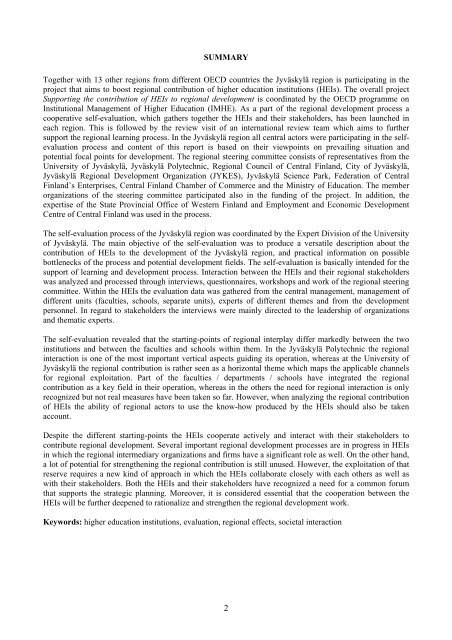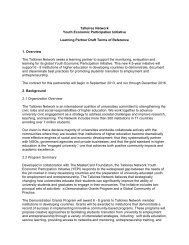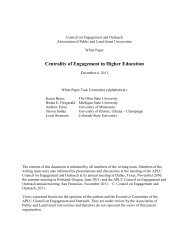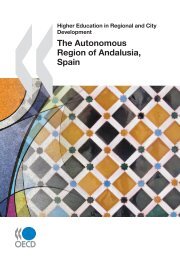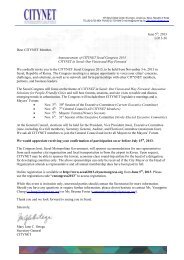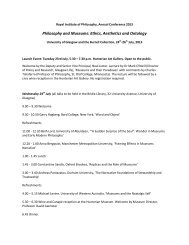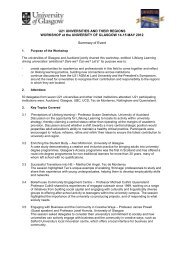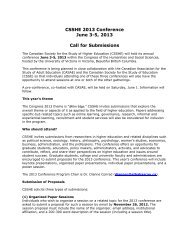Finland - Jyvaskyla Region - Final Self-Evaluation Report.pdf
Finland - Jyvaskyla Region - Final Self-Evaluation Report.pdf
Finland - Jyvaskyla Region - Final Self-Evaluation Report.pdf
Create successful ePaper yourself
Turn your PDF publications into a flip-book with our unique Google optimized e-Paper software.
SUMMARYTogether with 13 other regions from different OECD countries the Jyväskylä region is participating in theproject that aims to boost regional contribution of higher education institutions (HEIs). The overall projectSupporting the contribution of HEIs to regional development is coordinated by the OECD programme onInstitutional Management of Higher Education (IMHE). As a part of the regional development process acooperative self-evaluation, which gathers together the HEIs and their stakeholders, has been launched ineach region. This is followed by the review visit of an international review team which aims to furthersupport the regional learning process. In the Jyväskylä region all central actors were participating in the selfevaluationprocess and content of this report is based on their viewpoints on prevailing situation andpotential focal points for development. The regional steering committee consists of representatives from theUniversity of Jyväskylä, Jyväskylä Polytechnic, <strong>Region</strong>al Council of Central <strong>Finland</strong>, City of Jyväskylä,Jyväskylä <strong>Region</strong>al Development Organization (JYKES), Jyväskylä Science Park, Federation of Central<strong>Finland</strong>’s Enterprises, Central <strong>Finland</strong> Chamber of Commerce and the Ministry of Education. The memberorganizations of the steering committee participated also in the funding of the project. In addition, theexpertise of the State Provincial Office of Western <strong>Finland</strong> and Employment and Economic DevelopmentCentre of Central <strong>Finland</strong> was used in the process.The self-evaluation process of the Jyväskylä region was coordinated by the Expert Division of the Universityof Jyväskylä. The main objective of the self-evaluation was to produce a versatile description about thecontribution of HEIs to the development of the Jyväskylä region, and practical information on possiblebottlenecks of the process and potential development fields. The self-evaluation is basically intended for thesupport of learning and development process. Interaction between the HEIs and their regional stakeholderswas analyzed and processed through interviews, questionnaires, workshops and work of the regional steeringcommittee. Within the HEIs the evaluation data was gathered from the central management, management ofdifferent units (faculties, schools, separate units), experts of different themes and from the developmentpersonnel. In regard to stakeholders the interviews were mainly directed to the leadership of organizationsand thematic experts.The self-evaluation revealed that the starting-points of regional interplay differ markedly between the twoinstitutions and between the faculties and schools within them. In the Jyväskylä Polytechnic the regionalinteraction is one of the most important vertical aspects guiding its operation, whereas at the University ofJyväskylä the regional contribution is rather seen as a horizontal theme which maps the applicable channelsfor regional exploitation. Part of the faculties / departments / schools have integrated the regionalcontribution as a key field in their operation, whereas in the others the need for regional interaction is onlyrecognized but not real measures have been taken so far. However, when analyzing the regional contributionof HEIs the ability of regional actors to use the know-how produced by the HEIs should also be takenaccount.Despite the different starting-points the HEIs cooperate actively and interact with their stakeholders tocontribute regional development. Several important regional development processes are in progress in HEIsin which the regional intermediary organizations and firms have a significant role as well. On the other hand,a lot of potential for strengthening the regional contribution is still unused. However, the exploitation of thatreserve requires a new kind of approach in which the HEIs collaborate closely with each others as well aswith their stakeholders. Both the HEIs and their stakeholders have recognized a need for a common forumthat supports the strategic planning. Moreover, it is considered essential that the cooperation between theHEIs will be further deepened to rationalize and strengthen the regional development work.Keywords: higher education institutions, evaluation, regional effects, societal interaction2


